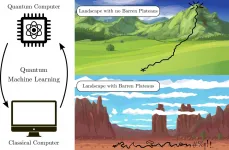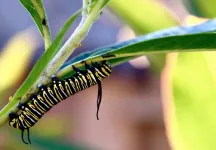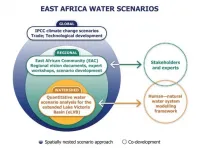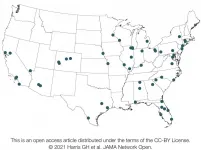(Press-News.org) CAMBRIDGE, MA -- Many viruses infect their hosts through mucosal surfaces such as the lining of the respiratory tract. MIT researchers have now developed a vaccination strategy that can create an army of T cells that are ready and waiting at those surfaces, offering a quicker response to viral invaders.
The researchers showed that they could induce a strong memory T cell response in the lungs of mice by giving them a vaccine modified to bind to a protein naturally present in mucus. This can help ferry the vaccine across mucosal barriers, such as the lining of the lungs.
"In this paper, we specifically focused on T cell responses that would be useful against viruses or cancer, and our idea was to use this protein, albumin, as sort of a Trojan horse to get the vaccine across the mucosal barrier," says Darrell Irvine, the senior author of the study, who is the Underwood-Prescott Professor with appointments in the departments of Biological Engineering and Materials Science and Engineering; an associate director of MIT's Koch Institute for Integrative Cancer Research; and a member of the Ragon Institute of MGH, MIT, and Harvard.
In addition to protecting against pathogens that infect the lungs, these types of inhaled vaccines could also be used to treat cancer metastasizing to the lungs or even prevent cancer from developing in the first place, the researchers say.
Former MIT postdoc Kavya Rakhra is the lead author of the study, which appears today in Science Immunology. Other authors include technical associates Wuhbet Abraham and Na Li, postdoc Chensu Wang, former graduate student Kelly Moynihan PhD '17, and former research technicians Nathan Donahue and Alexis Baldeon.
Local response
Most vaccines are given as an injection into the muscle tissue. However, most viral infections occur at mucosal surfaces such as the lungs and upper respiratory tract, reproductive tract, or gastrointestinal tract. Creating a strong line of defense at those sites could help the body fend off infection more effectively, Irvine says.
"In some cases, vaccines given in muscle can elicit immunity at mucosal surfaces, but there is a general principle that if you vaccinate through the mucosal surface, you tend to elicit a stronger protection at that site," Irvine says. "Unfortunately, we don't have great technologies yet for mounting immune responses that specifically protect those mucosal surfaces."
There is an approved nasal vaccine for the flu, and an oral vaccine for typhoid, but both of those vaccines consist of live, attenuated viruses, which are better able to cross mucosal barriers. Irvine's lab wanted to pursue an alternative: peptide vaccines, which have a better safety profile and are easier to manufacture, but are more difficult to get across mucosal barriers.
To try to make peptide vaccines easier to deliver to the lungs, the researchers turned to an approach they first explored in a 2014 study. In that paper, Irvine and his colleagues found that attaching peptide vaccines to albumin proteins, found in the bloodstream, helped the peptides to accumulate in the lymph nodes, where they could activate a strong T cell response.
Those vaccines were given by injection, like most traditional vaccines. In their new study, the researchers investigated whether albumin could also help peptide vaccines get across mucosal barriers such as those surrounding the lungs. One of albumin's functions is to help maintain osmotic pressure in the lungs, and it can easily pass through the epithelial tissue surrounding the lungs.
To test this idea, the researchers attached an albumin-binding lipid tail to a peptide vaccine against the vaccinia virus. The vaccine also included a commonly used adjuvant called CpG, which helps to provoke a stronger immune response.
The vaccine was delivered intratracheally, which simulates inhalation exposure. The researchers found that this type of delivery generated a 25-fold increase in memory T cells in the mouse lungs, compared to injecting the albumin-modified vaccine into a muscle site far from the lungs. They also showed that when mice were exposed to the vaccinia virus months later, the intramuscular vaccine offered no protection, while all of the animals that received the vaccine intratracheally were protected.
Targeting tumors
The researchers also tested a mucosal vaccine against cancer. In that case, they used a peptide found on melanoma cells to immunize mice. When the vaccinated mice were exposed to metastatic melanoma cells, T cells in the lungs were able to eliminate them. The researchers also showed that the vaccine could help to shrink existing lung tumors.
This kind of local response could make it possible to develop vaccines that would prevent tumors from forming in specific organs, by targeting antigens commonly found on tumor cells.
"In both the virus and the tumor experiments, we're leveraging this idea that, as other people have shown, these memory T cells set up shop in the lungs and are waiting right there at the barrier. As soon as a tumor cell shows up, or as soon as a virus infects the target cell, the T cells can immediately clear it," Irvine says.
This strategy could also be useful for creating mucosal vaccines against other viruses such as HIV, influenza, or SAR-CoV-2, Irvine says. His lab is now using the same approach to create a vaccine that provokes a strong antibody response in the lungs, using SARS-CoV-2 as a target.
INFORMATION:
The research was funded by the Bridge Project of the Koch Institute and the Dana-Farber/Harvard Cancer Center; the Marble Center for Cancer Nanomedicine; the Ragon Institute of MGH, MIT, and Harvard; and the National Institutes of Health.
To understand the fundamental properties of an industrial solvent, chemists with the University of Cincinnati turned to a supercomputer.
UC chemistry professor and department head Thomas Beck and UC graduate student Andrew Eisenhart ran quantum simulations to understand glycerol carbonate, a compound used in biodiesel and as a common solvent.
They found that the simulation provided detail about hydrogen bonding in determining the structural and dynamic properties of the liquid that was missing from classical models. The study was published in the Journal of Physical Chemistry B.
Glycerol carbonate could be a more environmentally ...
During a public health crisis like the COVID-19 pandemic, U.S. hospitals need to allocate scarce medical resources in an equitable manner, according to clinicians and ethicists at the University of Miami Miller School of Medicine.
"Significant concerns have been raised that crisis standards of care may be biased against certain patients based on race or ethnicity," said Hayley Gershengorn, M.D., associate professor of pulmonary and critical care medicine. "To examine that issue, we analyzed over a thousand medical records from two academic hospitals where University of Miami faculty see patients and found no disparities ...
In-school COVID-19 transmission is rare - even among close school contacts of those who test positive for the virus - when schools heed public health precautions such as mandatory masking, social distancing and frequent hand-washing, according to results of a pilot study in Missouri aimed at identifying ways to keep elementary and secondary schools open and safe during the pandemic. A close contact is anyone who has been within 6 feet for more than 15 minutes in a 24-hour period with someone infected with COVID-19.
The study is part of a larger, ongoing collaboration involving the Centers for Disease Control and Prevention (CDC), Washington University School of Medicine in St. Louis, ...
LOS ALAMOS, N.M., March 19, 2021--Many machine learning algorithms on quantum computers suffer from the dreaded "barren plateau" of unsolvability, where they run into dead ends on optimization problems. This challenge had been relatively unstudied--until now. Rigorous theoretical work has established theorems that guarantee whether a given machine learning algorithm will work as it scales up on larger computers.
"The work solves a key problem of useability for quantum machine learning. We rigorously proved the conditions under which certain architectures of variational quantum algorithms will or will not have barren plateaus as they are scaled up," said Marco Cerezo, lead author on the paper published in Nature Communications ...
Notwithstanding last month's cold snap in Texas and Louisiana, climate change is leading to warmer winter weather throughout the southern U.S., creating a golden opportunity for many tropical plants and animals to move north, according to a new study appearing this week in the journal Global Change Biology.
Some of these species may be welcomed, such as sea turtles and the Florida manatee, which are expanding their ranges northward along the Atlantic Coast. Others, like the invasive Burmese python -- in the Florida Everglades, the largest measured 18 feet, end-to-end --maybe less so.
Equally unwelcome, and among the quickest to spread into warming areas, are ...
In light of recent extreme climate events--from wildfires blazing through the western US to snowstorms sweeping Texas into a blackout--climate scientists and media outlets have repeatedly called out the urgency of tackling the climate crisis. But in a new study published March 19 in the journal One Earth, researchers found that emphasizing urgency alone is not enough to kindle public support for climate change policies.
"We had the impression that policymakers shy away from enacting ambitious, stringent climate policy because they're afraid of ...
IIASA researchers worked with local stakeholders from the East African Community to explore and co-develop regional water scenarios that can enhance understanding of the up- and downstream water sector interactions in the extended Lake Victoria Basin to facilitate rational water resource planning.
East Africa is the world's fastest growing region outside of Asia, with an estimated growth of 5% and above over the last decade. Part of this success can likely be attributed to the East Africa Vision 2050, which was launched in 2015 by the Heads of States of the East African Community (EAC) - an intergovernmental organization composed of six countries in the African Great Lakes ...
PITTSBURGH, March 19, 2021 - A University of Pittsburgh School of Medicine-led survey of dozens of surge capacity managers at hospitals nationwide captures the U.S. health care system's pandemic preparedness status in the months before the first COVID-19 cases were identified in China.
Published today in the journal JAMA Network Open, the investigation details the strain experienced by U.S. hospitals during the 2017-18 influenza season, which was marked by severe illness and the highest infectious disease-related hospitalization rates in at least a decade. At the time, pandemic planning ...
A new research study at the University of Chicago Medicine has found that when it comes to COVID-19, having vitamin D levels above those traditionally considered sufficient may lower the risk of infection, especially for Black people.
The study, published March 19 in JAMA Open Network, retrospectively examined the relationship between vitamin D levels and likelihood of testing positive for COVID-19. While levels of 30 ng/ml or more are usually considered "sufficient," the authors found that Black individuals who had levels of 30 to 40 ng/ml had a 2.64 times higher risk of testing ...
What The Study Did: This analysis examined how patients with multiple sclerosis who have COVID-19 fare and what patient and disease characteristics are associated with worse outcomes.
Authors: Amber Salter, Ph.D., of Washington University in St Louis, is the corresponding author.
To access the embargoed study: Visit our For The Media website at this link https://media.jamanetwork.com/
(doi:10.1001/jamaneurol.2021.0688)
Editor's Note: The article includes conflict of interest and funding/support disclosures. Please see the article for additional information, including other authors, author contributions and affiliations, conflict of interest and financial disclosures, ...





